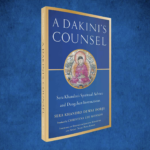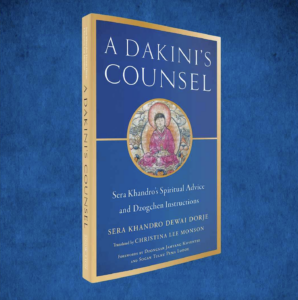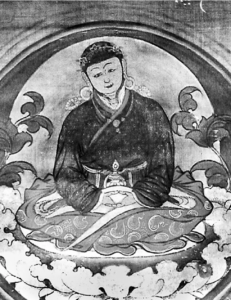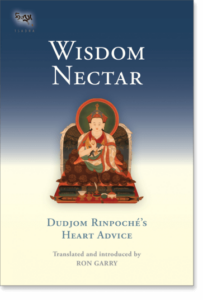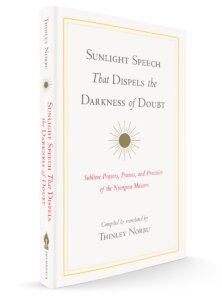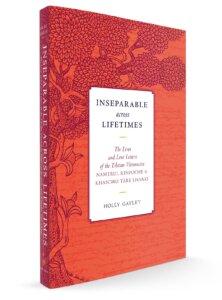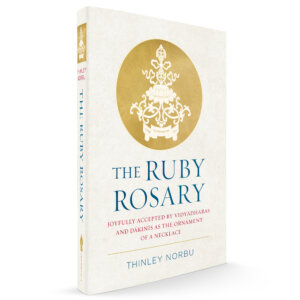Heart Advice: Pronouncements Before Passing
A Selection from Chapter 8
Excerpted from A Dakini's Counsel: Sera Khandro's Spiritual Advice and Dzogchen Instructions
By Sera Khandro
Translated by Christina Monson
About This Title
Sera Khandro Dewai Dorje was a modern Tibetan Buddhist teacher who single-pointedly pursued a life of Dharma while balancing family life and public teaching. This collection of her advice, prayers, dreams, prophecies, and treasures (terma) is both biographical and instructional. It comes from within the tradition of Dzogchen, replete with practices for resting in the nature of mind. This lineage forms the bedrock of Christina Monson’s own spiritual path, lending a deep intimacy to the translations, which serve as a window into Sera Khandro’s life, teachings, and rich inner experience.
Heart Advice
Chapter 8, page 341-350
For Buddhist practitioners, death is an extraordinary opportunity. For it is that moment, when consciousness separates from the confines of physical form, that luminosity dawns and blazes as never before. Those who can seize the moment, by recognizing what is, are liberated on the spot. For others, subsequent events present further portals for recognition as the phenomena of the bardo unfold. Given the potency of the death experience for awakening, the Tibetan tradition as a whole, and especially the Dzogchen tradition, offer a plethora of skillful supports for the dying.
It is a natural inclination for those sensing into their own deaths, whether imminent or not, to want to say what is most important before the opportunity to do so is gone. To fully internalize the truth of death leads to speaking the truth, however and whatever that may entail for an individual. In this context, the tradition of final testaments (zhal chems), teachings and advice offered as the most essential by masters to disciples, enriches Tibetan Buddhism as a whole and especially the world of shaldam. Dewai Dorje’s writings contain several such selections, two of which conclude this final chapter.
“Heart Advice, A Final Testament,” written for Drime Ozer, covers with deeply felt earnestness crucial instructions on practicing most aspects of the path. Combining spiritual and practical advice, Dewai Dorje holds nothing back in telling her beloved exactly what she thinks he should and shouldn’t do. The intimacy between them is revealed in the moving and genuine pronouncements of what she sees would be dangerous for him. This degree of comfort and familiarity speaks to a relationship between heart Dharma friends, stripped of the formalities that otherwise could color communication between individuals of differing status within the tradition. Dewai Dorje taught Drime Ozer as an equal in a relationship of loving mutuality.
The final piece, “A Beggar Lady’s Final Testament,” combines the highest Dzogchen instructions with foundational Dharma advice. Written for monastics, it synthesizes Dewai Dorje’s indispensable counsel. For those who need something concise and easy to implement, this can be taken everywhere. It is as relevant for Dharma practitioners today as it was for her community one hundred years ago.
While neither of these final testaments is dated, Dewai Dorje might have written them at any time over her decades of life in eastern Tibet. From its language, the first likely was written before the passing of Drime Ozer in 1924. It’s not unusual for teachings labeled as final testaments to be composed well before a master’s actual passing. Genuine practitioners are steeped with the truth of impermanence and know that death can arrive at any moment. The urgency therefore to say what is most crucial is always upon them. What would be possible if such were the case for all of us?
Heart Advice, A Final Testament
How wondrous!
Superb Heir of All Victorious Buddhas,
gone before, present now, and still to come,
Secret Consort throughout All Lifetimes,
Great Hero—please, hear me.I have little freedom,
since my past accumulation of merit and wisdom was weak.
I have fallen under the control of others,
and as I am forced to wander in faraway places,
my despair never lifts.I have no desire to leave you, dearest partner,
equal to my heart, eyes, and very life.
But when negativity forces us apart for a little bit,
please, listen to this heart advice,
a final testament of what I am thinking.Transmitting the mani mantra to the Great Compassionate One,
or teaching sentient beings in the presence of Buddha—
this is not what I am doing.
Since our hearts are harmoniously intertwined
and we have great love and pure samaya between us,
I am just telling you what I think,
without hiding or changing anything.Visualize your father and lama,
the actual buddha of triple time,
Dudjom Dorje Drolo Tsal [Dudjom Lingpa]
constantly upon your crown.
Since he’s unrivaled among hundreds of lamas,
you don’t need to rely on others,
as there is the danger of breaking samaya.Yidam deities, empty in their appearing, arise as the lama
and are perfected as an expanse of self-arisen supports and supported manifestations.
You don’t need development practice that fixates on these appearances.
This brings the danger of falling into perpetual reification.Mantra’s speech is the language of the unborn, emptiness.
Breathing in and out is the wheel of mantra.
You don’t need to count mantra recitation conceptually.
You risk breaking its continuity with pointless chatter.Self-arisen mind, beyond causes and conditions,
is spontaneously present as an exalted state of primordial perfection.
You don’t need to use antidotes of accepting and rejecting.
These carry the danger of obscuring the twofold radiance of wisdom.Present in and of itself and uncompounded,
the dynamic energy of space and awareness
appears as kayas and orbs of five-colored light.
This is the actualization of the natural radiance of the four visions and six lamps.
You don’t need to rely upon mere relative interdependencies.
These bring the danger of temporary visual experiences of light rays.In the illusory displays of dakinis, mind’s magical manifestations,
connate primordial wisdom arises as the dakinis’ creative power.
You don’t need to hold these as separate and distinct.
Doing so risks inviting unwanted punishment.The miraculous display of the haughty protectors’ wrath
steals the life force of any enemy that is visualized.
Killing for meat and beating drums is pointless.
Misunderstanding the messengers risks harming yourself.Wrathful, supreme method, the body of the vajra king
penetrates the bhaga of the queen of unchanging space.
You don’t need beautiful human seductresses.
They bring the danger of losing the potency
of your channels, winds, and vital essences.Supreme accomplishment is evidenced by the power to reveal profound treasures,
which are to be held as precious as life itself without any disrespect.
You don’t need to compose teachings using the conventional language of intellectuals.
Doing so risks profound teachings falling into the hands of transgressors.Upon the face of the clear mirror of self-arisen phenomenal existence,
the symbolic writing of the mother-dakinis appears in images.
Practice these, the dakinis’ oral instructions, precisely as they should be.
You don’t need to seek divination about the chaotic appearances of delusion.
That brings the danger of being deceived by evil spirits.Through powerful and persistent prayers, genuine Dharma holders,
endowed with spiritual wealth yet humble in appearance,
will come to your door.
View them wisely, protect them,
and give them ripening and liberating instructions.
You don’t need to live according to others’ ethics.
Doing so puts you in danger
of wrong intentions, obstacles, and negative circumstances.The spread and supervision of profound Dharma teachings
are controlled by the dakinis of ultimate reality.
You don’t need to cater to the wishes of ordinary humans.
That carries the danger of mistaking the timing of Dharma teachings.When the father’s riches are mined by the son,
empty awareness, the best wisdom-dakini partner,
is taken as the siddhi beyond method and wisdom.
You don’t need human ladies as consorts.
This risks entanglement with one who isn’t your destined partner.The sole heart son Natsok Rangdrol
will rely on only you as refuge, now and in the future.
Protect him lovingly, and kindly give him the profound teachings.
You don’t need to go to Gangri Tokar.4
There’s the danger of getting sick and dying.When you instruct students in both worldly and spiritual matters,
some cannot be tamed by gentleness and need wrath,
and some cannot be tamed by wrath and need gentleness.
Care for all beings with fearless conduct.
You don’t need to hope, fear, or pretend anything.
Pandering to others risks giving them control of your mind.For transgressors untamed by either wrath or gentleness,
incite the powerful display of the haughty protectors as opponents
who will wipe them out until nothing, not even their names, remain.
You don’t need to talk idly with transgressors.
Doing so risks getting lost in their wildness.Food taken and clothing worn
are the wheel of the two accumulations,
enjoyments to be invested as ornaments.
Don yourself with nice clothing and enjoy special foods!
You don’t need to eat and dress like a beggar.
Doing so risks offending the wisdom deities in your body’s mandala.When enacting great deeds for the teachings of the Buddha and beings,
if you stay in retreat, you will accomplish benefit for self and other.
You don’t need to run around on horseback doing village rituals.
Doing so risks being affected by obscurations of ripened karma.Trust only yourself.
You don’t need the competition and conflict of friends and enemies.
Sweet talkers with hearts of black smoke
bring the danger of losing your freedom to others.Without feeling discouraged by all these faults,
focus on serving the Buddha’s teachings and sentient beings.
The word death is just a bubble.
Your own perception will dawn as a buddha field,
present in and of itself.
Sera Khandro (1892–1940) was one of the most prolific Tibetan female authors of the past several centuries. At the age of fifteen, she left her home in Lhasa for eastern Tibet, embarking on a lifetime devoted to her spiritual path—she became a spiritual master, a revealer of ancient hidden teachings, a mystic, a visionary, a writer, a mother, and a vagabond. Her written works and spiritual lineage have been preserved and are now cherished worldwide.
Christina Monson (1969–2023) was a Buddhist practitioner and teacher and Tibetan language translator and interpreter. She had over thirty years of study, translation, and practice experience in Buddhism beginning with an interest in Asian philosophy as an undergraduate student at Brown University. Later, she focused her studies on Tibetan Buddhism while completing a master’s degree at the University of Wisconsin–Madison. She journeyed to Nepal in 1989 where she met her root guru, Chatral Sangye Dorje Rinpoche, under whose guidance she studied and practiced in periods of intensive retreat for the next twenty-seven years. Chatral Rinpoche first introduced her to the person and treasure lineage of Sera Khandro Dewai Dorje and conferred empowerment, reading transmission, and practice instructions. She spent the last several years of her life translating Sera Khandro’s sheldam (instructions) into English as a Tsadra Foundation translator and scholar, along with teaching and practicing the Dharma.
Related Books on Sera Khandro

